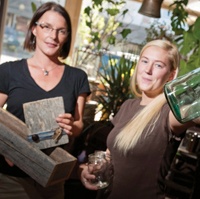Common-sense Tact Blossoms on Brick Street
by October 18, 2010 12:00 am 155 views

When Holly Mang moved from the Pacific Northwest to Northwest Arkansas, she brought ideas and practices that were “just common sense for me.”
Because her previous home has been more progressive than her new one in addressing environmentally friendly practices, many of Mang’s practices focused on sustainability. Brick Street Botanical, for example, avoids the use of chemical additives to prolong flowers’ freshness.
“We just change our water,” Mang said.
Such seemingly simple practices add up to a greater good. That, one judge noted, “is exactly the kind of grassroots action that’s going to make a difference.”
“We’re definitely a little guy. We’re pretty tiny,” said Mang, who has three part-time employees. “But I still do my best to set an example.”
One of the best examples of Brick Street’s practices is its reuse of boxes. Mang returns many of the flower boxes she receives to suppliers who can reuse or recycle them.
Mang also finds a convenient and practical use for many of the boxes that come her way.
“I could buy delivery boxes,” she said, “but I get boxes that can be turned into delivery boxes.”
Mang also reuses vases regularly brought into the store by St. Vincent de Paul Catholic Church. Mang even practices utility conservation by utilizing an open door and fans during most of the year.
Because of the way Mang operates, Brick Street was a natural candidate when the Rogers-Lowell Area Chamber of Commerce partnered with Green Plus Institute for Sustainable Development. Among other goals, Green Plus aims to “educate, motivate, and recognize smaller enterprises for their efforts toward greater sustainability regardless of their means.”
The organization also promotes a “triple bottom line principle,” which translates into “conducting a financially sustainable operation with a positive environmental impact that fully engages its employees and stakeholders in its success.”
“It was just how we functioned,” Mang said of marrying Brick Street’s practices to Green Plus’ principles. “It’s cost-effective to be green.”
